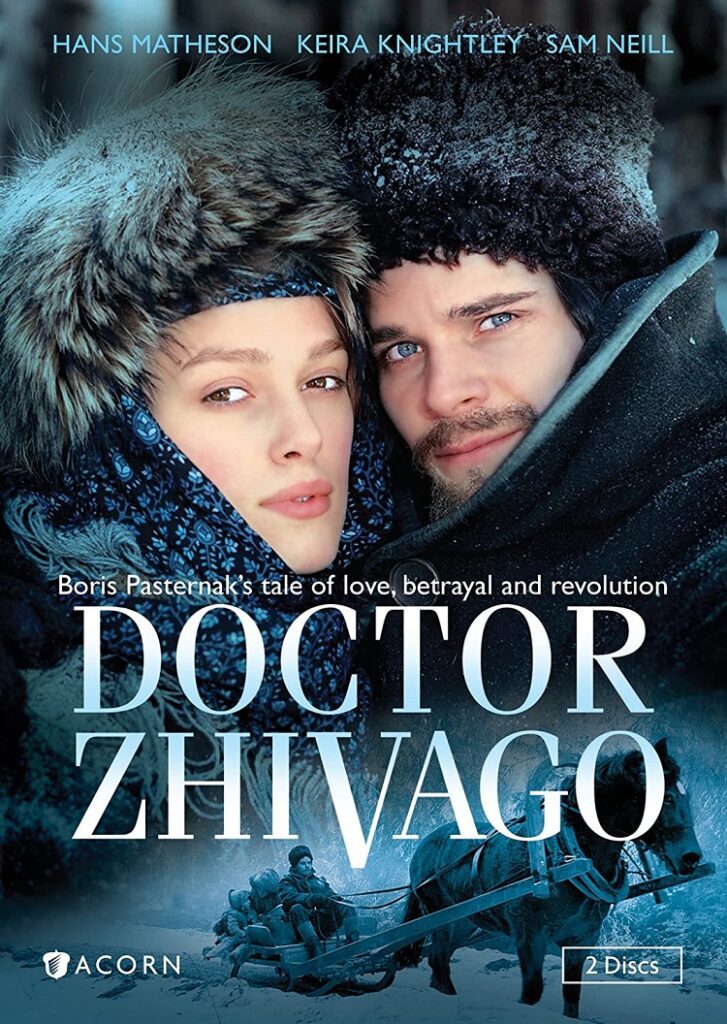
Written by Brandie Ashe
Upon its controversial publication in 1957, Dr. Zhivago—an epic tale of love and betrayal set amidst the turbulent Russian conflicts of the early twentieth century—virtually begged for a film adaptation. British director David Lean complied in 1965 with a lush, ambitious version that won five Academy Awards, including one for its iconic musical score (indeed, the film’s main leitmotif, “Lara’s Theme,” remains an immensely popular tune that rivals “Somewhere Over the Rainbow” for its prevalent use in music boxes). The Oscar-winning screenplay by Robert Bolt plays quite loosely with the novel, borrowing and discarding some characters and plotlines almost at random, and eschewing the more political elements in favor of ratcheting up the love story—a choice that genuinely weakens the film’s impact, watering it down to the level of a beautifully-staged soap opera.
>The 2002 BBC adaptation of Zhivago, directed by Giacomo Campiotti, has much the same problem. Dramatic scenes depicting the gritty rigors of war and the political strife inciting revolution are given fairly short shrift here in favor of an overabundance of softly-lit love scenes and montages of happy lovers chasing one another through grand houses. Though this version does adhere somewhat more closely to the novel than its cinematic predecessor, screenwriter Andrew Davies nonetheless eliminates several important plot points while excising and/or altering the characterization of some of the players (and—it must be said—as in Lean’s version, the actors’ attempts to employ Russian accents range from “barely effective” to “Wow, that Russian schoolgirl sounds just like Mary Poppins”). But while Lean’s film still manages to engage interest largely due to a charismatic cast and its magnificently grand scale, this smaller, more intimate television version suffers in comparison from a more claustrophobic presentation and an egregiously miscast leading lady.
This Zhivago features the intriguingly expressive Hans Matheson stepping into Omar Sharif’s shoes as the titular doctor, who begins the movie as an orphan, having just witnessed his father kill himself by jumping off a moving train. Young Yuri goes to Moscow to live with his aunt, uncle, and young cousin, Tonya (played as an adult by Alexandra Maria Lara), and grows up happily with his new family, eventually becoming a doctor and a gifted poet. Meanwhile, the beautiful Lara Guishar (Keira Knightley) lives with her mother, Amalia (Maryam d’Abo), who owns a dressmaking shop. Amalia supports herself in part through sexual liaisons with a well-connected, wealthy businessman, Victor Komarovsky (Sam Neill), who has an unhealthy interest in young Lara (Komarovsky, as Yuri soon discovers, is also the man whose cheating ways drove Zhivago’s father to suicide). Though Lara despises the man, Komarovsky and Lara embark upon an affair, and over time, he becomes even more obsessed with her, vowing to never let her go.
Zhivago and Lara cross each other’s paths at various times, and each is captivated by the other. Zhivago goes on to marry Tonya, while Lara escapes Komarovsky’s control and weds Pasha Antipov (Kris Marshall), a young revolutionary. As war breaks out, Zhivago is conscripted into the army, and Lara becomes a nurse so she can seek out Pasha, who has enlisted and subsequently disappeared. The two meet once more in the battlefield and fall in love while working together, but they return to their homes without admitting it to one another. When war breaks out once more, Zhivago and his family head for the mountains, and he is reunited with Lara once more. But with dangers from the Communist-controlled government looming over all of them, and Zhivago’s heart split between two women, it seems there can be no happy ending for anyone involved.
Watching this miniseries brings one big question to my mind: why do people continue to cast Keira Knightley as these great, complicated, epic literary heroines? Her Lizzie Bennet in Pride and Prejudice (2005) woefully misses the mark, mistaking haughty arrogance for sly wit and playfulness. Her Anna Karenina from the same-titled 2012 film runs the gamut from hysterical to overly polished, with only the barest of hints of the desperate passion that drives the character to her tragic fate throughout Leo Tolstoy’s novel. Knightley is a gorgeous woman, to be sure, but her portrayals of these iconic characters somehow ring flat—a pretty façade, but no beating heart behind it. Sadly, the same is true here, for while her Lara is beautiful to look at, there’s a dryness to her emoting, a lack of heat to her diatribes against Neill’s infinitely more effective Komarovsky, that renders her portrayal almost amateurish in comparison with her costars.
Still, despite Knightley’s less-than-palatable performance, there are certain elements to recommend this film (Sam Neill being at the top of that list—seriously, the man is the best thing about the entire enterprise). The filmmakers utilize black-and-white documentary footage of revolutionary Russia as segues between certain acts, which then morph into color footage from the movie—an intriguing choice that adds a sense of realism to the action onscreen. There are some interesting set-pieces sprinkled throughout the film, and the dazzling array of era-appropriate costumes is a veritable feast for the eyes. Limited by the restraints of television, the cinematography leaves something to be desired; there are a few sweeping panoramas of snow-covered vistas, but these visual treats are far outnumbered by their gloomier, more constrained counterparts throughout the film.
Doctor Zhivago is newly available on DVD or for digital download from Acorn Media, so you can judge for yourself whether or not this film can stand on its own from its storied literary and cinematic precursors. The two-disc DVD set (which is essentially a reissuing of the original DVD release from 2003) includes the complete U.K. broadcast edition of the film as well as a couple of relatively negligible special features—brief cast and crew interviews, a slideshow biography of Pasternak, a gallery of movie stills, and selected filmographies for Matheson, Knightley, and Neill (though these are far from comprehensive, only covering their careers up through the production of this film).